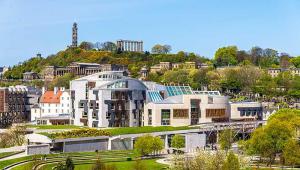Derek Mackay has heard warnings from the Scottish Parliament’s finance and constitution committee that in the wake of last month’s draft budget, councils had been left with no option but to consider stripping services back to the statutory minimum.
Although the total allocation to local government under the proposals rose in real terms by 0.7%, non-ringfenced revenue funding fell by 3.4%, or almost £320m, in real terms, fuelling concern from the local government sector that essential services would no longer be sustainable.
But Mackay said that councils had been allocated “the best possible settlement” given the restraints on the Scottish Government’s own budget, with a real-terms increase to both revenue and capital spending.
“I don’t underestimate the challenge in any part of the public sector…I have tried to give local government the best possible settlement in the circumstances - that is a real-terms increase notwithstanding the fiscal challenge that I’ve been presented with,” he said.
He explained he recognised the financial pressure councils were under, but that it was up to other parties in the course of budget negotiations to spell out where any extra money for local government should come from.
Councils also had the ability to supplement their income by up to £80m across Scotland by opting to increase council tax by 3%, he said.
He refuted a suggestion from Scottish Greens MSP Patrick Harvie that the Scottish Government had, through the council tax capping regime, tied the hands of councils, while itself benefitting from fiscal freedom to raise revenue through its own tax policy.
“Shouldn’t local councils also have that ability to make fiscal choices at the local level that are right for their circumstances rather than being constrained in the way that they currently are?” said Harvie.
“At least when Margaret Thatcher did rate capping, she had the decency to do it on a statutory basis, and not by bullying.”
Mackay said the government’s commitment to council tax capping was “hardly underhand” as it had been one of the manifesto pledges on which it had been elected.
He said that the debate now underway over the merits of a discretionary local tourist tax proved that he was open to the prospect of councils gaining further local tax raising powers.
“Right now, we are having the national discussion around the transient visitor levy…so I think I’ve shown I am open minded on this; I’m happy to engage if people bring forward constructive suggestions to further empower that local decision making,” Mackay said.
Councils in Scotland have been lobbying vigorously for the right to tax visitors in order to alleviate the burden placed by tourism, with City of Edinburgh Council proposing a charge of either 2% or £2 per room per night, which it calculates would raise up to £14.6m a year.










